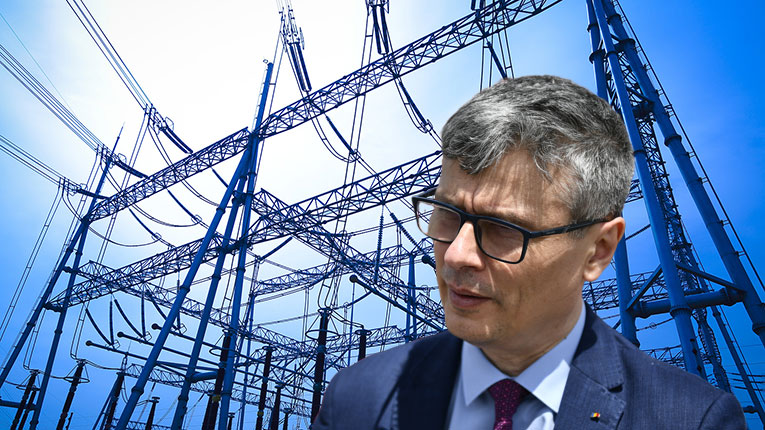While the entire energy industry eagerly awaits Brussels’ response to the presentation by the Romanian authorities of the new scheme provided for by GEO 119, the Minister of Energy, Virgil Popescu, announces that he met with his Bulgarian counterpart Hristov Rossen “to discuss the importance of regional cooperation “, according to Virgil Popescu’s social media page. The industry expects the presentation of GEO 119 to be heavily criticized by EC officials and the ordinance to undergo major changes. Let’s not forget that the shareholders of the companies affected by GEO 119 have under their management, in Romania and abroad, assets of hundreds of billions of euros and are perfectly capable of a strong lobby in Brussels.
“Today I am at the work of the Energy Council, which is held in Brussels. On this occasion, I had a bilateral meeting with the Minister of Energy of Bulgaria, Hristov Rossen, to discuss the importance of regional cooperation for the operationalization of the European Energy Platform for the joint purchase of natural gas, as well as the operationalization of the Vertical natural gas corridor and the Trans-Balkan one, for to ensure increased energy stability in the region.
“Also, Romania and Bulgaria will join forces regarding preparations for winter and the role of indigenous resources with baseload production in ensuring energy independence and security of supply,” Virgil Popescu’s statement on Facebook reveals. For now, nothing about OUG 119.
“Friday, September 9, the extraordinary meeting of the Council of the European Union takes place, which will debate the measures proposed by the European Commission to reduce energy prices this winter. Among them are the temporary capping of prices and methane gas from Russia, the decoupling of the price of gas from electricity, which is the one that raises the price of the entire production chain, the modification of some market rules to create liquidity, but also measures to limit consumption of fossil gases, such as reducing demand and encouraging energy savings and ensuring the implementation of RePowerEU measures,” says the environmental NGO Bankwatch.
Through RePowerEU, the European Commission proposes that in 2030 around 45% of the EU’s energy comes from renewable sources, more than half compared to the current level. To achieve this goal, hundreds of billions of euros are needed, invested and with the support of the EU, which allocates important funds to member countries. These costs will be partially offset by annual savings of 84 billion euros from reduced fossil fuel imports, the European Union’s plan says.
What will Romania actually have to do?
Among the discussions, the energy efficiency and saving program of each country will be taken into account, through the mandatory reduction of electricity consumption at the peak of consumption – a measure proposed by the EU, but not by Romania.
“The GEO must be amended to include the obligation that the EU will impose. Methods of imposing this obligation are similar to those used before 1989:
– Changing the program of commercial companies, so as to change the consumption profile
– The introduction of bonuses / taxes on transactions made on electricity delivered during peak consumption hours (possible only for those with smart meters)
– Interruption of energy supply at peak consumption, according to the model existing before 1989 in Romania (unlikely),” claims Dumitru Chisăliță, president of the Intelligent Energy Association.
Most likely, the regulation of the commercial margin of low-cost energy producers (renewable energy) that make high profits will also be considered, the exception being the profits that will be reinvested.
GEO 119/2022 does not have a measure to reduce the commercial margin of renewable energy producers. Again, the GEO does not provide for the provision of financial sources (most likely government guarantees) to ensure the necessary support for supply and trading companies, so that they continue trading futures, comply with their forward contracts and maintain the increased liquidity of the energy markets and natural gas, thus avoiding market blockages.
“The measures in GEO 119/2022 are radically opposed to this measure. Romania has just developed a plan of measures that deepens the risk of financial blockade and discourages suppliers and traders from trading,” adds Chisăliță.
Capping the price of Russian gas is another possible measure, although in theory there will soon be no more Russian gas supplied due to sanctions.
“There was no such measure in GEO 119/2022. If the EU measures will be binding, the GEO must be amended to include these measures. This decision will bring Romania to a situation where it will probably no longer benefit from imported gas (according to the statements of the Russian president), with an impact on the provision of gas throughout the winter, at the level of all consumers, at any time.”
In conclusion, the EU measures are not found in GEO 119, which causes the cancellation of the recently approved GEO and the creation of another one, increasing the chaos on the gas and electricity market.
“Consumers, institutions, producers, suppliers, etc., after starting to change software, procedures, instructions, will find themselves in the situation that in a few days they will have to start all over again,” concludes Chisăliță.

